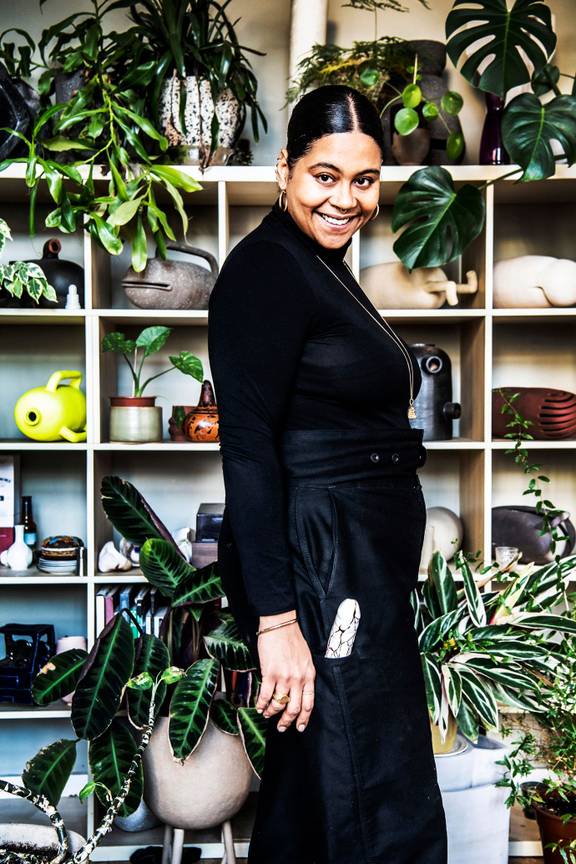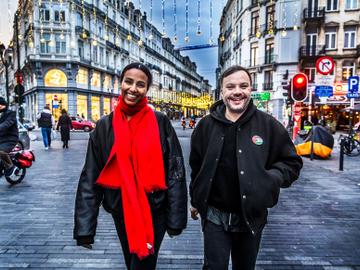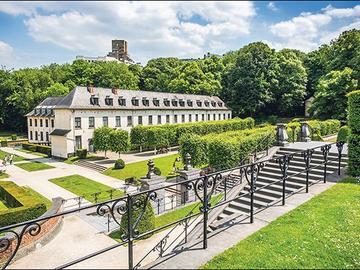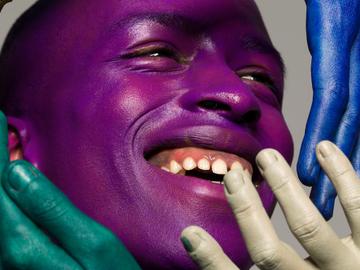Activist, ceramicist, and performance artist Ophélie Mac deconstructs the fantasy images that are projected onto black women in interactive performances that mix humour and subversion. She also started the platform Fatsabbats, which is organised by and for racialised and queer women in Brussels.

© Saskia Vanderstichele
Artist Ophélie Mac: 'I use dildos to tackle many subjects'
In 2012, the young French visual artist Ophélie Mac arrived in Brussels to begin a master's degree in ceramics at La Cambre. Almost immediately, people began to stop her in the street, mistaking her for someone called Sarah. Intrigued, she went in search of Sarah and found her, only to realise that they didn't really look alike at all. “We found ourselves facing that stereotype of the mixed-race woman, large and fat; in the eyes of most people, we were the same person.”
They became friends and, taking the story to its logical conclusion, Ophélie used herself and Sarah as models for the caryatids that she presented for her master's. As the icing on the cake, she asked Sarah to make her presentation to the jury in her place. For an hour, the pseudo-doppelganger presented Ophélie Mac's work to a jury made up of, among others, teachers she had worked alongside for three years. Nobody noticed the difference.
That misunderstanding, which reflects the way that black women are perceived in the West, is at the core of her work. “It challenges what we see, what we perceive, what we project, and what fantasies we have about racialised women. With performances like Tout doit disparaître, I try to alternate between the fantasy images of the caring nanny, the angry black woman, and the exotic woman, an object of fantasy.”
Ophélie Mac
- Born in Paris in 1988
- Studies Fine Arts and takes part in the exhibition Le silence des bêtes at Centre Pompidou in 2012
- Moves to Brussels the same year to pursue a master’s degree in ceramics at La Cambre
- Does interactive performances that mix dildos and politics, humour and subversion at Les Halles, the PAN Asia festival in Seoul and the São Paulo Biennial
- In 2019, she starts the platform Fatsabbats, organised by and for racialised and queer women
- Performs in Rebecca Chaillon’s Carte noire nommée désir
Tout doit disparaître plays with tropes from teleshopping and Tupperware parties. With her hair pulled back, dressed in a white apron, Ophélie, or Mac Coco as she is also known, handles ceramic dildos like precious objects, selling them as functional and hard-wearing. “The project began at La Cambre with a series of ceramic penile shafts that I made. I sold two of them and the feedback I received from the second person was that it had changed her life. She was delighted with how comfortable it was to use, far more so than the electric kind. After a long conversation with her, I decided to use the dildos to launch a project that would be political as well as funny. I could use it to tackle many subjects, from sexuality to decolonisation, the art market, and the absence of racialised women's bodies in contemporary art.”
The product demonstration with which the performance begins is the starting point for a dialogue between the artist and the audience. “There are so many questions that can be tackled, depending on the audience before me. I can draw on the origins of the objects, their use, their advantages and disadvantages. It is constantly evolving. It has been going for a few years now. I have presented it to very different audiences, in cultural centres, to groups and organisations, and at design and contemporary art fairs. The performance can also be brought to people's homes for private events. When I am with a small group of five or six people in someone's home, it adds another dimension and can raise questions about hygiene, for which I seek the advice of specialists when I don't have the answers.”
'I try to alternate between the fantasy images of the caring nanny, the angry black woman, and the exotic woman'
Sharing is caring
Listening and care are also at the heart of several of her other performances, such as the washing of feet, inspired by the Catholic rite, which she presented in the crypt in the Sint-Joost/Saint-Josse church. That ethos is also reflected in the voluntary work that she has always carried out in addition to her artistic work. In Brussels, it has taken the form of Fatsabbats, an organisation that the artist set up in 2019, based in a space in the Anneessens district, run by and for racialised women and the queer community of Brussels.
The place was an indirect victim of the pandemic and had to close, but it will soon be reborn in a new form. “I will be reopening in a mobile format, working with venues and institutions such as Atelier 210, La Bellone, the Kaaitheater, and the Beurssschouwburg.” The objective is to offer cultural events that give visibility to queer or racialised artists and host group counselling sessions, for example, for single mothers or for trans people who are experiencing family issues during transition.
“When I opened Fatsabbats, there was no budget. I did it because it was an emergency and I paid for it all out of my own pocket, which became a bit complicated once Covid hit. I had to do things differently and seek funding and collaborations in order to accommodate these people in a safe place without putting myself in danger. When Fatsabbats opened, it was the first space to offer that kind of support and the opportunity to enjoy such a socially diverse environment. There was a demand for it and, I realised, there was a need: that's what pushes me to keep going.”
Read more about: Expo , Ophélie Mac , Mac Coco , La Cambre , Fatsabbats , la balsamine



